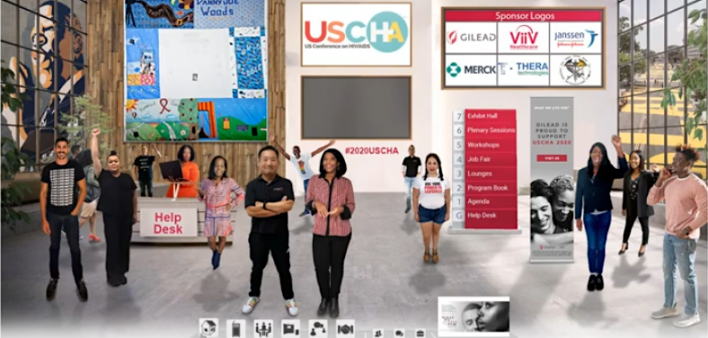Like many blockbuster events this year, the United States Conference on HIV/AIDS, a multiday extravaganza ordinarily held in a different U.S. city each October that draws thousands of advocates, researchers and community members, is taking place virtually. In fact, it’s happening right now, Monday through Wednesday, October 19 to 21.
Spearheaded by NMAC (formerly the National Minority AIDS Council), the event still includes plenary speeches, workshops, exhibit hall and networking opportunities. Another big change this year is that the event is free for the first 4,000 participants (registration has ended). And since the events are virtual, they will available for viewing during the next year.
The conference’s schedule is available on USCHA.life, as is a webinar that introduces attendees to the event’s virtual platform (you can also watch that video at the top of this article).
The events start at noon, Monday, October 19, with the opening plenary discussion, titled “Family Reunion 2.” “The Opening Plenary sets the tone for the meeting by examining how racism stops our work from being successful and blocks our efforts to end HIV,” writes NMAC executive director Paul Kawata in his POZ blog. “It is a tough plenary, particularly for White people with privilege. It’s not enough to say you stand with Black lives; you also have to do the work. You have to hear and understand the stories of Black and Brown people and how racism impacts our daily existence.”
Other plenary sessions include “Gilead Plenary Session: Creating a Different World,” “ViiV Positive Action: How Arts and Culture Can Spark Change and Combat Stigma” and “Closing Plenary Session: Federal Perspectives on EHE [Ending the HIV Epidemic] Efforts in the Era of COVID-19.”
A wide variety of workshops are scheduled, covering topics such as:
- HIV 50+ and Social Media—Building Virtual Communities
- Practicing Antiracism: A framework for the HIV health care workforce
- National Implementation of Interventions to Address Trauma
- Housing Opportunities for Persons With AIDS (HOPWA): The Fundamentals
- Comics as a Medium to Educate Black Women on HIV
- COVID Unmasks Ageism in HIV Communities
- On the Front Lines: Modifying Syringe Services Due to COVID-19
What’s more, attendees can virtually stroll through an exhibit hall and socialize in four different lounges:
- Trans Lounge
- 50+ Lounge
- Youth Lounge
- People Living With HIV (PLWHIV)
“This year’s virtual conference will be unlike any USCHA,” Kawata wrote in his blog. “While it will never replace in-person meetings, we hope it will remind everyone that they are part of the HIV family.”







Comments
Comments